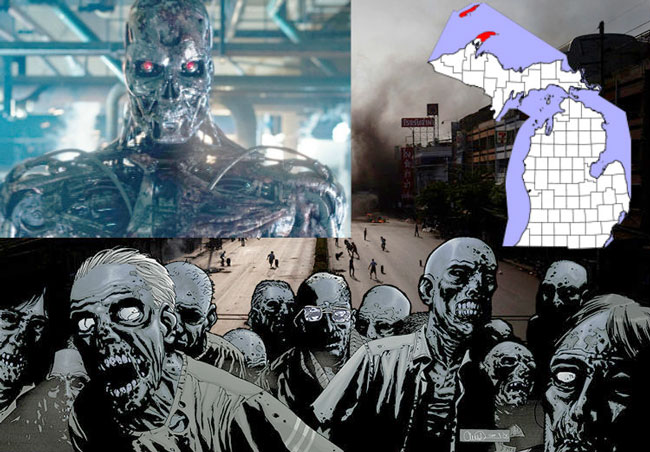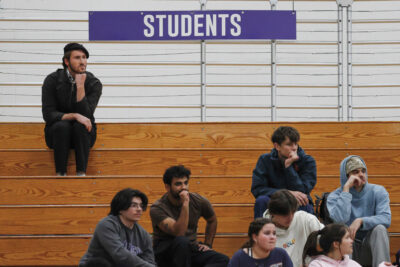“Hey, it’s not the end of the world.” This oft parroted phrase is used to comfort those who worry way too much about way too little. But are we approaching a time when we’ll start saying it ironically? Maybe.
All I know is that I’ll be prepared for it, and you can too! So grab some canned food and a tin foil hat and let’s delve into the world of hyper-speculation and millennial cynicism to grapple with three potentially world-ending scenarios, because what else is the Funnies section good for?My first question is: how many kindergarten-sized zombies could you take out with a baseball bat? Okay, maybe I’ve been watching too much of “The Walking Dead,” but hear me out.
You’re alone in the world, there’s no cure, everyone’s dead, unfeeling and trying to eat you. All you’ve got is a baseball bat, and you’re staring at a horde of what used to be kindergarteners.
How many of the little buggers can you hold off before you go down, and the sad orchestral music starts playing, and the camera pans slowly away from your thrashing body up to the beautiful clouds in the sky? I like to think that my life will end Hollywood-style, but is this realistic?
According to the doomsday theorists, of course! Scientists have been warning for years that a superbug is coming; a bacteria strain resistant to every antibiotic we have, evolved from induced selection pressure thanks to our prescription-happy medical industry.
In my humble opinion, it is much more fun to think about how many kindergartner-zombies I could take out with a baseball bat than the latter. The answer is 10, by the way.
Death by artificial intelligence is another frightening possibility. Last year Google’s DeepMind project created a program that defeated the world’s best player at Go, a game so complex that the number of possible game outcomes is greater than the number of atoms in the universe. Brute computation couldn’t have done it – the computer needed to learn, to develop intuition.
To get that good, the program practiced against itself hundreds of millions of times, which is roughly the same number of times I had to practice parallel parking before my ability became even remotely average.
As for me, I’m not scared of a “Terminator” scenario – what I’m worried about is my winning streak in “Mario Kart” – or any other game for that matter. If I’m losing badly to an A.I. in “Mario Kart” and they start trash talking me, I would not hesitate to rip out their battery pack like a bloody heart. I for one did NOT survive the zombie apocalypse just to be belittled by a narcissistic android on Rainbow Road.
Finally, we have climate change. Like the development of the superbug or super intelligence, it is no longer a question of if, but when. Sadly, the reality is that it’s happening now. In particular, there’s the problem of water scarcity, and as we are seeing from our colleagues in Peru, it’s a problem set to become even more challenging with climatic variability.
Depressing, I know. But have no fear! You can SURVIVE all THREE of these apocalyptic scenarios with this one simple trick that natural selection hates! All you need to do is…
…move to Isle Royale, in Keweenaw, Michigan. I’m serious – it’s the least populated county in the Upper Peninsula, making a disease outbreak extremely unlikely. It also is an ISLAND with no internet or satellite coverage, a huge obstacle for the robot armies. And as if it couldn’t get better, it’s smack in the middle of the world’s largest body of freshwater, Lake Superior.
Still not convinced? It’s on no major fault lines, it’s outside tornado alley and by 2050 it will average a balmy 75 degrees throughout the year. I’ve checked, and land is cheap! It’s a measly $3,000/acre, a small price to pay to live in the safest place on Earth.
Whether it’s zombies, robots or running out of water, any scenario about the end of the world is frightening. Still, I think they are worth thinking about, because all the scenarios ultimately require a reexamination of our values, like peacemaking, for example. What WOULD a pacifist do in a zombie, robot or a zombie/robot-double-whammy apocalypse?
Admittedly, these are extreme. But the world is changing so fast now that we need to be prepared to see major philosophical shifts in our lifetimes as new problems present themselves – problems that for a long time seemed unlikely, or too futuristic for worthwhile consideration (a water shortage in Goshen??).
Daydreaming about apocalypses can be depressing, but can also be helpful exercises in imagining how our core values should or will change in the years to come, which is a good thing. And as great as my plan is, I hope that Goshen graduates don’t run away from apocalypses, but run towards them.



